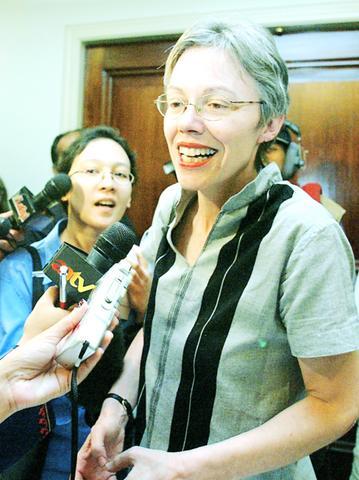An American researcher whose work helped expose a network of al-Qaeda-linked terrorists in Indonesia has been ordered out of the country for violating her work permit, an immigration official said yesterday.
However, terrorism expert Sidney Jones claimed that Indonesia's intelligence agency was behind the expulsion order because it considered reports published by her group, International Crisis Group (ICG), to be "subversive."
The order represents a blow to freedom of expression in Indonesia, which critics say has been gradually eroded since democratic reforms were ushered in after the downfall of ex-dictator Suharto in 1998.

PHOTO: REUTERS
The government has jailed several student activists and journalists critical of President Megawati Sukarnoputri -- currently seeking re-election -- and other political leaders.
Jones, 52, from Albany, New York, said she was given the deportation order late on Tuesday. It cited immigration violations and was effective immediately.
Her Australian assistant analyst, Francesca Lawe-Davies, 27, was also ordered to leave.
Indonesia's immigration department spokesman Ade Endang Dahlan confirmed the order yesterday, saying Jones had violated the terms of her work permit, but he gave no more details.
Earlier, authorities had said they might not renew Jones' visa, which expires on June 10. It was unclear why the government stepped up its action against her on Tuesday.
"I was devastated to learn that I had to leave Indonesia, but now I am just furious," she said. "I am not sure when I have to leave. I am assuming they'll give [me] time to pack."'
The Belgium-based think tank opened its office in Jakarta in 2000.
In 2002, the group released detailed reports on the activities of the al-Qaeda linked Jemaah Islamiyah terror group in Indonesia at a time when the government refused to acknowledge its existence.
Jemaah Islamiyah was blamed for the Oct. 12, 2002, Bali bombings. Police have since arrested scores of its members.
ICG has also produced critical reports on the government response to separatist conflicts in Aceh and Papua provinces as well as religious violence in Central Sulawesi.
Some officials and diplomats have privately complained that the terrorism reports were alarmist and were so often cited in the Western media that they hurt the country's economy, particularly its tourism sector.
The ICG's president, former Australian foreign minister Gareth Evans, said the expulsion order was served with "a desire to smother legitimate criticism."
"This will do far more damage to Indonesia's reputation than [to] the ICG's," he said. "This is a sad day for those hoping for better from Indonesian democracy."
Foreigners have largely been immune to Megawati's crackdown on critics, although a court jailed British national Lesley Jane McCulloch, an academic critical of the government, for five months after she was caught in Aceh in 2002.
Megawati is currently trailing her main rival in opinion polls ahead of presidential elections scheduled for July 5.

A fire caused by a burst gas pipe yesterday spread to several homes and sent a fireball soaring into the sky outside Malaysia’s largest city, injuring more than 100 people. The towering inferno near a gas station in Putra Heights outside Kuala Lumpur was visible for kilometers and lasted for several hours. It happened during a public holiday as Muslims, who are the majority in Malaysia, celebrate the second day of Eid al-Fitr. National oil company Petronas said the fire started at one of its gas pipelines at 8:10am and the affected pipeline was later isolated. Disaster management officials said shutting the

US Vice President J.D. Vance on Friday accused Denmark of not having done enough to protect Greenland, when he visited the strategically placed and resource-rich Danish territory coveted by US President Donald Trump. Vance made his comment during a trip to the Pituffik Space Base in northwestern Greenland, a visit viewed by Copenhagen and Nuuk as a provocation. “Our message to Denmark is very simple: You have not done a good job by the people of Greenland,” Vance told a news conference. “You have under-invested in the people of Greenland, and you have under-invested in the security architecture of this

Japan unveiled a plan on Thursday to evacuate around 120,000 residents and tourists from its southern islets near Taiwan within six days in the event of an “emergency”. The plan was put together as “the security situation surrounding our nation grows severe” and with an “emergency” in mind, the government’s crisis management office said. Exactly what that emergency might be was left unspecified in the plan but it envisages the evacuation of around 120,000 people in five Japanese islets close to Taiwan. China claims Taiwan as part of its territory and has stepped up military pressure in recent years, including

UNREST: The authorities in Turkey arrested 13 Turkish journalists in five days, deported a BBC correspondent and on Thursday arrested a reporter from Sweden Waving flags and chanting slogans, many hundreds of thousands of anti-government demonstrators on Saturday rallied in Istanbul, Turkey, in defence of democracy after the arrest of Istanbul Mayor Ekrem Imamoglu which sparked Turkey’s worst street unrest in more than a decade. Under a cloudless blue sky, vast crowds gathered in Maltepe on the Asian side of Turkey’s biggest city on the eve of the Eid al-Fitr celebration which started yesterday, marking the end of Ramadan. Ozgur Ozel, chairman of the main opposition Republican People’s Party (CHP), which organized the rally, said there were 2.2 million people in the crowd, but